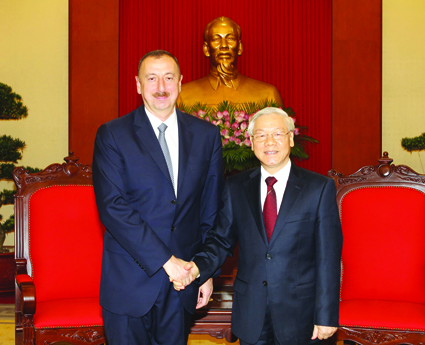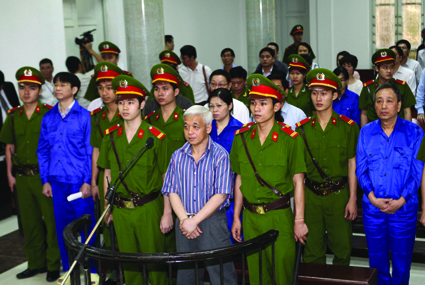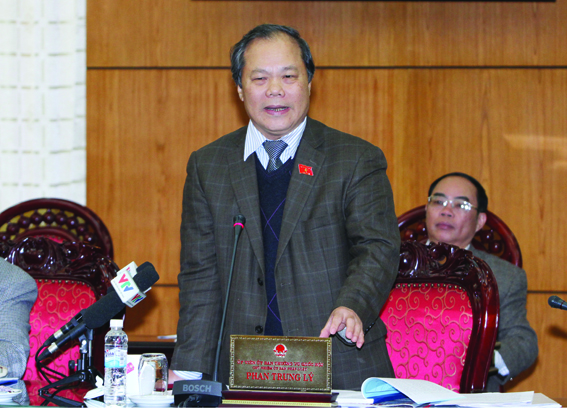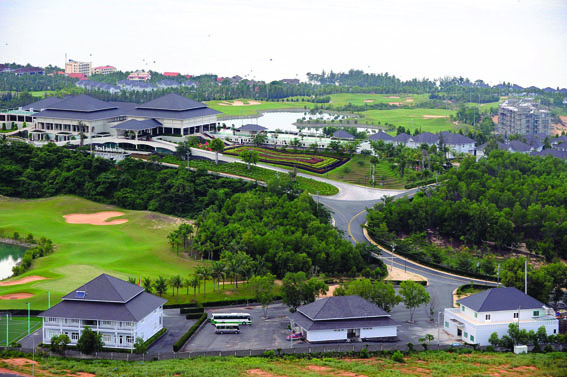Hoang Van Nghia[1], LL.D
Le Thi Thu Mai[2], LL.M
The constitution is the supreme legal-political document of a country and concurrently the profound crystallization of humane, progressive and civilized values of a society, expressing the noble will and aspirations of the people which have been formed from the sacrifice and age-old desire of the nation. The constitution establishes the underpinning principles for the formation, organization and operation of political, economic and social institutions, especially the organization and operation of state power bodies. More importantly, the ultimate goal of the principles of organization and operation of political institutions (of which the state apparatus is the core) is to assert and protect the fundamental rights and freedoms as well as lawful interests of citizens and all individuals in the society.

Tho district, Lai Chau province __Photo: Quy Trung/VNA
Through the five constitutions (1946, 1960, 1980, 1992 and 2013), the fundamental rights and freedoms of citizens have constantly been expanded and developed in terms of subjects, content and assurance and enforcement institutions.
Development of citizens’ rights and freedoms from the 1946 Constitution to the 1992 Constitution
The 1946 Constitution: As the first Constitution of the Democratic Republic of Vietnam, which was one of the first people’s democratic states in Southeast Asia, this Constitution provided very progressive institutions ahead of its time on the fundamental rights and freedoms of citizens.
Passed on November 8, 1946, by the Ist National Assembly at its second session, the 1946 Constitution had 18 articles out of total 70 articles directly governing the fundamental rights and freedoms of citizens. This Constitution was written on the three fundamental principles: (i) affirming the primacy of the law in general and the supremacy of the Constitution in particular; (ii) asserting the fundamental rights and freedoms of citizens, which are closely associated with their obligations; and (iii) ensuring equality among ethnicities and the great solidarity of the nation.
The 1946 Constitution affirmed the political rights of citizens: “All citizens have equal rights in economic, social, cultural and political fields” (Article 6); “All citizens are equal before law and have the right to participate in administrations and the cause of national construction, depending on their talents and ethical virtues” (Article 7); “Women have equal rights as men in all fields” (Article 9); and “Ethnic minority people shall be assisted in all fields in order to catch up with the common level” (Article 8).
Citizens’ freedoms and democratic rights were guaranteed, including freedom of speech, the right to association, the right to assembly, freedom of the press, freedom of belief, and freedom of movement (Article 10); personal freedom and inviolability of correspondence (Article 11); private ownership of property (Article 12); rights of children, the elderly and people with disabilities (Article 14); and the right to education of ethnic minority people (Article 15).
Especially, the citizens’ right to remove elected officials from office was provided in Article 20 under which the National Assembly shall consider the proposal to remove a National Assembly deputy when it is made by one-fourths of voters of the locality where this deputy is elected. This is a very effective form of exercising direct democracy in overseeing the state power and activities of National Assembly deputies.
The 1946 Constitution also provided an extremely important right of the people, the right to referendum, which was the cornerstone of modern constitutional thinking, reflecting the spirit that human rights are noble and that all state power stems from the people; the people’s will is the root of the state power in particular and of all social institutions as a whole. The Constitution asserted the right to referendum on the Constitution and affairs related to the nation’s destiny (Article 21), stating that referenda must be held on affairs related to the nation’s destiny (Article 32) and on constitutional revision (Article 70).
The 1946 Constitution also enshrined the citizens’ right to participate in state affairs (the right to participate in political affairs), which was not only expressed in the right to election, the right to stand for election or other freedoms and democratic rights, but also in the manner of participating in the policymaking process in particular and the management of state affairs in general. For instance, Article 30 established the right to attend National Assembly sessions: “The National Assembly conducts public sessions where the public may attend to hear.”
The 1960 Constitution: This Constitution was passed on December 31, 1959, by the Ist National Assembly at its 11th session, and effective on January 1, 1960. It re-affirmed the basic values of the 1946 Constitution regarding the fundamental rights and freedoms of citizens. This Constitution had 21 articles out of total 72 articles regulating the rights and freedoms of citizens. It extended the subjects and contents of citizens’ rights, paying special attention to the rights of vulnerable groups (women, children, people with disabilities, etc.), and economic, social and cultural rights.
For instance, the 1960 Constitution concretized the rights of equality in salary enjoyment; pre- and post-natal leave; protection of mother and child interests by the State; development of maternity homes, daycare centers and kindergartens; and marriage and family protection (Article 24). It supplemented the right to employment; the right to work and rest; and social security rights (Articles 30, 31 and 32).
The 1980 Constitution: Passed on December 18, 1980, by the IVth National Assembly at its seventh session, at a time when the country was unified and advanced to socialism, this Constitution continued to affirm the fundamental rights and freedoms of citizens already enshrined in the previous constitutions.
The 1980 Constitution devoted 29 articles regulating the fundamental rights and freedoms and obligations of citizens. This 147-article Constitution inherited the principles on human rights in the previous constitutions while extending the subjects and contents of certain rights. It reaffirmed the citizens’ fundamental rights and freedoms in civil, economic, socio-political and cultural fields and defined the state responsibility for guaranteeing these rights. It said that the citizens’ rights are inseparable from citizens’ obligations; and human rights are reflected in citizens’ rights. It placed emphasis on such economic and social rights as the rights to labor, education, rest and social security.
The 1992 Constitution: This is the Constitution of the renewal period, which institutionalized the renewal spirit of the country initiated in 1991. Passed on April 15, 1992, by the VIIIth National Assembly at its 11th session, the 1992 Constitution, with the same number of chapters and articles as that of the 1980 version, devoted 34 articles to defining the rights and obligations of citizens.
To meet practical requirements of the renewal process, the 1992 Constitution had its preamble and a number of articles revised under the National Assembly’s Resolution No. 51/2001/QH10 of December 25, 2001.
The 1992 Constitution retained only four articles (49, 52, 76 and 80) of the 1980 Constitution, and had eight articles which were completely new or contained new provisions, e.g., the citizens’ right to business freedom (Article 57), and the right to own and inherit property (Article 58).
Worthy of note, for the first time in the supreme legal tool of the Vietnamese State, “human rights” were established in Article 50 in terms of both definition and content, which stated: “in the Socialist Republic of Vietnam, human rights in the political, civil, economic, cultural and social fields are respected and reflected in citizens’ rights and prescribed in the Constitution and law.” The 1992 Constitution also reaffirmed and concretized the rights and freedoms of citizens in all civil, political, social, economic and cultural fields.
Freedoms of citizens prescribed in the 1992 Constitution include freedom of movement (Citizens have the right to free movement and residence in the country, the right to go abroad and return home from abroad in accordance with law - Article 68); freedom of speech and freedom of the press; the right of access to information; the right to assembly, the right to association, and the right to demonstrate in accordance with law (Article 69); freedom of belief and religion, and the right to follow any religion or to follow no religion (Article 70); the right to inviolability of body and to protection of life, health, honor and dignity by law (Article 71); the right to inviolability of domicile (Article 73); the right to protection of citizens’ legitimate interests by the State during overseas residence (Article 75); and the right of vulnerable groups (women, children, the elderly, helpless people, etc.) to protection and care by the State (Articles 63 thru 67).
The 2013 Constitution and development of fundamental rights and freedoms
The 2013 Constitution of the Socialist Republic of Vietnam was passed on November 28, 2013, by the XIIIth National Assembly at its sixth session with 97.59% of votes for. This Constitution has laid a foundation for the period of accelerated international integration and development of the country.
Compared to the 1992 Constitution, the 2013 Constitution retains only seven articles, adds 12 new ones and revises 101 others. The new provisions that are directly related to the fundamental rights and freedoms of citizens and individuals include:
1. Changes in the order and title of the chapter on human rights, rights and obligations of citizens:
The new Constitution has made a noteworthy adjustment of the order and title of this charter. The chapter on citizens’ fundamental rights and freedom is moved to the second position, following the chapter on the political regime. This change in the chapter position is not merely a technical matter but reflects changes in theoretical perception and constitutional thinking. That is the first time since 1946 the issue of human rights and citizens’ rights and obligations is put in its inherent solemn position. This reflects changes in our Party’s awareness and theoretical thinking as well as our state’s constitutional thinking in considering human rights and citizens’ rights and obligations as key issues in designing the new Constitution.
At the same time, this change affirms and upholds the principle of supreme sovereignty belonging to the people and the principle of the socialist state ruled by law and of the people, by the people and for the people.
Regarding the title of Chapter II, it is the first time in the constitutional history the concept of “human rights” has been included in the title of the chapter, instead of only “citizens’ rights and obligations” like other previous Constitutions. The addition of the phrase “human rights” is of great significance in the practical context of national development and international integration. Again, this is not simply a matter of constitutional technique but reflects a progressive constitutional thinking in line with the trend of the nation, era and humankind. Constitutions of other countries in the region and the world show that a majority of provisions on citizens’ rights and freedom is put in a chapter titled “human rights” or “fundamental human rights and freedoms”. With the use of the terms “human rights and citizens’ rights and obligations” instead of the terms “fundamental rights and obligations of citizens” that were used as the chapter title in all previous constitutions, the new Constitution (2013) has officially elevated the provisions on human rights to the chapter status but not simply a content of a chapter in the Constitution.
2. Expansion of the content and subjects of human rights in general and fundamental rights and obligations of citizens in particular:
For example, it is the first time the complete concept “human rights” together with “citizens’ rights and obligations” are used for the chapter title. Subjects enjoying these rights are expanded from “citizens” to “everyone” and “group” (especially vulnerable groups). This is very important for integrating the content of international conventions on human rights to which Vietnam is a contracting party into the domestic legal system in conformity with the trend of increased progressiveness, integration and development. In the previous Constitutions, especially the 1992 Constitution, human rights were largely granted to “citizens” and not “everyone”. This is extremely important for the provisions on human rights as this is the first time the 2013 Constitution has determined subjects of human rights are everyone, not only citizens. This helps eliminate the confusion between human rights and citizens’ rights in the previous Constitutions.
3. A number of new rights have been supplemented in the 2013 Constitution, reflecting Vietnam’s integration and development trend. Four articles on four rights are completely new compared to the 1992 Constitution, in addition to more than 30 revised articles. New rights in the 2013 Constitution are the right to life (Article 19), the right to culture/cultural rights (the right to conduct scientific research or literary or artistic creation) (Article 40), the right to enjoy and access cultural values, participate in cultural life, and use cultural facilities (Article 41), and the right to environment (the right to live in a clean environment) (Article 43). This is a vigorous development in the provisions on human rights and fundamental rights and obligations of citizens. Among the new rights stipulated in the Constitution, the right to life is considered an obvious acknowledgement of Vietnam’s commitments to respect and protect everyone’s right to life, especially protect the right to life of vulnerable groups (including children, women, people living with HIV/AIDS, people with disabilities, etc). Article 19 of the Constitution affirmed: “Everyone has the right to life. Human life is protected by law. No one may be deprived of life in contravention of law.” Subjects of the right to culture are expanded in the 2013 Convention, which states: “Everyone has the right to conduct scientific or technological research, or literary or artistic creation, and to enjoy the benefits brought about by those activities” (Article 40) and “Everyone has the right to enjoy and access cultural values, participate in cultural life, and use cultural facilities” (Article 41).
The right to environment is provided for the first time in the 2013 Constitution: “Everyone has the right to live in a clean environment and has the obligation to protect the environment” (Article 43). Environmental right is a new type of right in the development of generations of human rights as well as the system of international law on human rights.
4. The Constitution has affirmed the respect of each person’s rights and freedoms must be put in the relationship with the respect of others’ rights and freedoms. In other words, the new Constitution has laid special stress on everyone’s obligation and responsibility in the capacity as a member of the society and a citizen of the state, namely the obligation to respect others’ rights. The new Constitution has stipulated “the obligation to respect others’ rights” that means “the right to be respected by others for one’s own rights and freedoms”. The Constitution asserts: “Everyone is obliged to respect others’ rights and the exercise of human rights and citizens’ rights may not be abused to infringe upon national interests and others’ lawful rights and interests” (Article 15).
5. The 2013 Constitution emphasizes institutions for effective exercise of human rights with an open provision on the establishment of an independent institution for effective protection of the underpinning principles of the Constitution as well as human rights. Article 119 (Clause 2) of the Constitution affirms: “The mechanism to defend the Constitution shall be prescribed by a law.” Furthermore, with the supplementation of the National Election Council and the State Audit Office and the modification and supplementation of the functions and duties of judiciary agencies, the 2013 Constitution has provided more effective tools in protecting and promoting fundamental rights and freedoms of citizens.-
[1] Deputy Director of the Human Rights Research Institute, Ho Chi Minh National Politics Institute
[2] Postgraduate student of the Politics Institute, Ho Chi Minh Natio7nal Politics Institute









